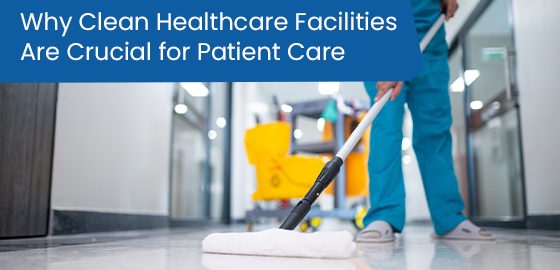Why Clean Healthcare Facilities Are Crucial for Patient Care

Hospitals are often known for the smell of bleach and other cleaning agents. The environment can smell “sterile,” and metal surfaces are usually shiny and gleaming. A clean environment for recovery from surgery, debilitating illness, or a place where pain is eased in the final moments is crucial for patient wellness and care.
However, this wasn’t always the case, as it’s only been in the last 100 years that the importance of a clean setting has been realized. In this blog, we will discuss why cleaning is essential in healthcare facilities.
A Brief History of Medical Care and Healthcare Cleaning
For a very long time, cleanliness in medical settings was overlooked. The focus was on how the body worked, rather than what made it sicker.
In the 1800s, people began to see the connection between health and cleanliness in medical facilities. Large groups of people recovering from a variety of ailments, and all in close proximity, would often get worse, thus increasing the mortality rate.
In the late 1800s, Florence Nightingale pioneered the way in hospital cleanliness, starting with opening windows, changing bedsheets, and cleaning dressings. She started to show people that hospitals needed to be cleaner.
Additionally, scientists such as Alexander Fleming, who discovered penicillin, began to understand that invisible things were making people ill and causing fatalities when the patient should have recovered. As science progressed, the medical cleaning process started to improve.
Why We Clean
In our home and work spaces, cleaning is done to improve our health and wellness. It provides a clean and fresh space where you can feel at ease. Grime and dirt are removed, increasing our overall happiness and uplifting our motivation to carry out daily tasks.
As the dirt and grime are removed, so are the bacteria that cause disease. When you are in a medical setting, this cleaning becomes increasingly important. From doctors’ offices to hospitals and hospice care centres, a clean and bright environment helps to lift people’s spirits and subconsciously makes them feel better.
On a microscopic level, medical cleaning with detergents and bleach kills the germs that patients are fighting, enabling them to recover and recoup faster. Also, the risk of complications is reduced.
Infection Control
With the recent pandemic still on many people’s minds, understanding the role that cleaning had during that difficult period shows just how important good cleaning is.
Infectious diseases love to travel on clothing, skin, and even in the air we breathe. In the case of contagious conditions such as C. diff, norovirus, and other communicable diseases, having a clean environment restricts the bacteria and viruses from travelling far and reduces their overall spread.
This prevents others from getting sick and allows the patient to recover better. In hospitals where there is a large number of staff and a larger number of patients, healthcare cleaning to improve infection control is paramount.
In a family doctor’s office or walk-in clinic, the need is the same. A large number of people can pass through the office quickly, and in much more confined spaces, so the risk of spreading infections is increased. Medical cleaning here needs to be done quickly and often.
Patient Safety and Medical Cleaning
Patients can end up in the hospital for many reasons, from breathing issues to requiring surgery, ongoing therapy, and more. The hospital staff need to move around quickly for emergency care, and family members need to be able to visit their loved ones.
Healthcare cleaning is more than just cleaning the floors and windows. Staff and visitors need to see their loved ones and people under their care without having to worry about their own chances of getting sick upon entering the building.
Cleaning reduces the risk of infection, re-infection, and transmission. Cleaning up spills and fluids on the floor and providing a clean and fresh environment for patients while they receive treatment is vital. Maintaining hospital cleanliness also provides a subconscious mental health boost.
Regulatory Compliance
Since patient care and health are paramount in a clinical setting, everything is governed by regulatory bodies. Their job is to make sure that these settings are cleaned to the highest standard to improve recovery, reduce mortality, and enhance morale.
Should the healthcare cleaning fall below such regulatory standards, then patient health and safety have the potential to become compromised, and the facility will be subject to review and may be fined.
Staff Morale and Patient Satisfaction
In all medical facilities, the standard of care should be of the utmost importance. However, if staff have to care for patients in dirty conditions, then morale drops and staff turnover rises. Often, life-saving therapy and treatments have a better success rate in clean environments, and patient response to care plans increases.
Dirty work environments are not conducive to good mental health, so the cleaner, the better, especially when the purpose is to provide medical care and comfort. Regular deep cleans and sanitization in healthcare facilities should therefore be the standard for all medical practices.
Contact RBC Clean for Professional Healthcare Cleaning
We have all had loved ones who have required medical care, from routine doctor appointments to in-hospital treatments. The staff at RBC Clean are no different, and that drives us to ensure the highest level of care is taken when cleaning medical establishments.
A clean hospital, hospice, or medical clinic not only gets a better reputation, but the care rate is higher due to the clean environment where bacteria, germs, and viruses have less of a chance to breed and spread.
We are up-to-date on the latest in cleaning products and methods. As our services include commercial and specialty cleaning, RBC Clean ensures that from home to hospital, every premise is cleaned and sanitized. For more information, you can call us at 1-855-493-9259 or contact us online.



